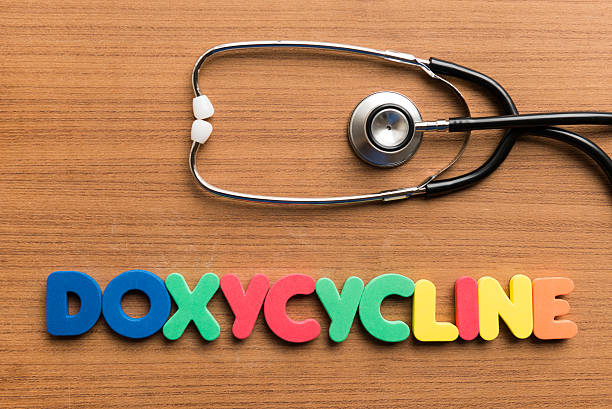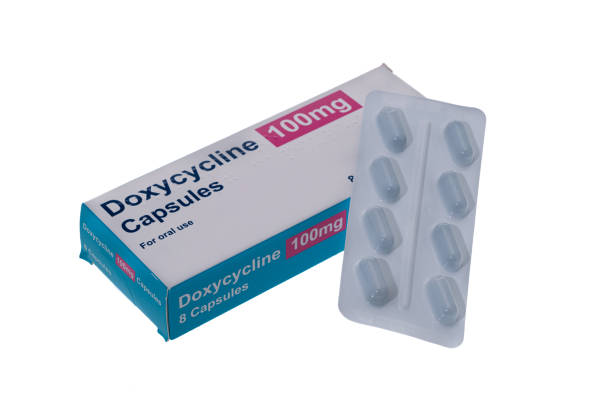







Many people struggle with acne problems as these can be mulish and difficult to treat. If you have even visited a dermatologist concerning stubborn acne, they may have been prescribed Doxycycline. It is a renowned skincare treatment option for acne-prone skin.
So, let's talk about Doxycycline and what you should be aware of while using it.
It is an antibiotic medication that is commonly prescribed for acne. It comes in tablet, capsule, suspension, and injection. It is sold under various brand names such as Acticlate, Alodox, Adoxa, Monodox, Vibramycin, Atridox, Oracea, and Doxycin. Generic versions of this drug are Doxycycline monohydrate and Doxycycline hyclate.
This medication is used to treat various bacterial infections such as severe acne, eye infections (trachoma), certain sexually transmitted diseases (gonorrhea), respiratory tract infections (sinusitis, bronchitis, or pneumonia), and urinary tract infections. It is also used for malaria prevention and to treat infections caused by tick bites (Rickettsial diseases), lice, or mites.
Other uses of this medication include the treatment of:
Rosacea (treat pimples and bumps only)
Syphilis
Chlamydia
Plague
Cholera
Anthrax
Certain infections caused by parasites
Moreover, it is also prescribed to treat gum disease by reducing gum pockets and improving tooth attachment in patients with a dental procedure.

Doxycycline belongs to the class of drugs known as tetracycline antibiotics which impede bacterial growth and have anti-inflammatory properties. It effectively acts against bacterial infections by reducing inflammation and killing the acne-causing bacteria.
Doxycycline tablets kill bacteria by hindering their ability to make proteins. For malaria-causing parasites the precise mechanism of action is unknown. It treats gum disease by preventing the breakdown of gum tissue.
Bacteria present on the skin can develop resistance to antibiotic medicines thus it is advised to limit the use of antibiotics including Doxycycline no more than 3-4 months.
Bacteria are present on everybody’s skin. Your skin is home to several types of bacteria. Normally, these bacteria are not troublesome. As puberty age begins, bacteria living in the pores of your skin can cause problems.
During puberty, oil glands begin to produce more oil. When extra oil production combines with dead skin cells and bacteria, it clogs the pores of the skin resulting in inflammation around that area. And here the anti-inflammatory and antibiotic actions of Doxycycline help treat acne.
Similar to any acne treatment drug, it takes some time to start its action. Usually, acne starts improving within 2 weeks after you begin with this medicine however it may take up to 12 weeks for complete results. If you notice less acne formation on your skin and your skin looks clearer, this medication works well.
Typically, dermatologists limit antibiotic treatment to three months to prevent the acne-causing bacteria from becoming resistant to this drug. However, every patient responds to a medication differently so you may not require it for longer.
Generally, healthcare providers prescribe this medicine with other topical treatments such as benzoyl peroxide or retinoid creams (used to treat skin conditions). Combination treatments prevent acne from coming back after you stop using this medicine. Using Benzoyl peroxide with Doxycycline avoids antibiotic resistance.
If your healthcare professional prescribed combination treatment that means you have to take Doxycycline and some other drugs at the same time, make sure you follow their directions carefully to get the maximum benefits.
The prescribed dosage of this drug is different for various patients. Stick to your doctor’s directions on the prescription label. If you have been prescribed a different dosage do not modify it without consulting your healthcare provider.
The prescribed dose is based on the strength of this product. The number of doses you take every day and how long you have to take this medicine depends on the condition being treated. The typical dosage for acne is Doxycycline 50 mg or 100 mg twice a day or 100 mg once a day. Some forms of this product are prescribed as 20 mg twice a day or 40 mg once a day.
If you missed a dose, take it immediately as you remember. If you remember about the missed dose when it is time for the next dose, leave the missed dose and go with your regular dosing schedule. Do not take two doses or an extra dose to compensate for the missed one.

Don’t take this drug if you are allergic to any tetracycline antibiotic medication. Children below 8 years of age can only use it in case of terrible or life-threatening conditions such as anthrax and Rocky Mountain spotted fever.
Tell your doctor if you ever have kidney disease, liver disease, asthma, increased pressure in the skull or you are taking seizure medication or blood thinners. Tell your healthcare provider if you ever have intracranial hypertension or lupus.
Tell your healthcare provider if you are pregnant, trying to become pregnant or you get pregnant while taking this medication. Taking it during pregnancy can affect the bone and tooth development of the unborn baby. Using it during the last trimester of pregnancy can lead to permanent tooth discoloration in the baby.
If you are using birth control pills to prevent pregnancy, this medicine can make them less effective. Talk to your healthcare professional about other effective birth control measures such as non-hormonal birth control methods to avoid getting pregnant.
Doxycycline may pass into the breast milk and can influence bone and tooth development in babies. The amount of absorption is not clear. Do not breastfeed your baby while taking this medication or consult your doctor to clear your doubts.
This antibiotic can make your skin more sensitive to sunlight. Sun exposure even for short periods may cause severe sunburn, itching, redness, rash, or skin discoloration. Try to avoid sun exposure and wear sunglasses and protective clothes if you have to go out. Apply sunscreen with at least SPF 30 or as suggested by your dermatologist. In case of severe reasons after sun exposure check with your healthcare provider.
Do not take other antibiotics or any other medications along with this medicine unless your healthcare provider prescribes to do so.
Do not take antacid laxatives, calcium supplements, multivitamins, or iron supplements 2 hours before or after this medication.
If you see no improvements in symptoms within a few days or if symptoms become worse, seek your doctor’s advice.
If you taking this drug to prevent malaria, be careful about mosquito bites. Keep yourself safe by wearing protective clothing, and using mosquito nets and repellents.
seek medical help in case of serious drug reaction.
Take it precisely as advised by your healthcare provider. Follow the directions on the description label carefully. You can take the Doxycycline capsules and tablets orally with a full glass of water. Consume plenty of liquids while using this medicine. Do not increase or decrease the dosage or take it for longer than prescribed until your doctor tells you.
Various Doxycycline brands come with various instructions concerning taking it with or without food. Most brands can be taken with food or milk to avoid an upset stomach. Some patients may experience nausea, in that case taking this medicine after a meal can help. Some forms of this medicine such as Oracea are prescribed to take on an empty stomach to allow complete absorption of the medicine. Ask your healthcare professional or pharmacist for the best way to take this medicine.
Swallow the tablet or capsule as a whole with water. If you find it difficult to swallow a regular capsule or tablet as a whole, you can open the capsule, break the tablet, and sprinkle the medicine onto a spoonful of applesauce so that you can swallow it easily.
Do not keep the mixture for later use. Drink a glass of water immediately to prevent oesophageal irritation. Do not chew or crush these medicines. You can break the tablet by holding it between your index fingers and thumb. Do not use it if it does not break on the separation line.
Replace Doryx 50 mg tablet with Doryx MPC 60 mg tablet and Doryx 100 mg tablet with Doryx MPC 120 mg tablet.
Shake the medicine well and measure it carefully with the measuring device or syringe provided with the medicine. If you have no measuring device, get one from your pharmacist. When you purchase your medicines from Grant Pharmacy, we make sure to provide the measuring device with liquid medications. Do not use regular spoons to avoid the incorrect dose.
This antibiotic medication is also administered through injection if the patient is not able to take it orally by mouth. Injection is only administered by a healthcare professional through an infusion into the vein.
Begin with the medicine 1 to 2 days before visiting the malaria-prone region. Take this drug continuously every day during your stay in that area and for up to 4 weeks after you leave. Take all preventive measures suggested by your doctor.
Make sure you take the prescribed brand of medicine because different brands of this drug may not work similarly. Take this product for the prescribed period, and do not stop before completing the prescribed course, even if symptoms improve. Avoid skipping doses as it can allow the infection to come back and cause antibiotic resistance. Do not use it after the expiration date has passed. Using expired products can damage your kidneys.
Most patients do well with this medication. However, some patients may experience side effects which are usually mild. The most common side effects of this drug are:
Sun sensitivity:
Doxycycline makes your skin sensitive to sunlight and you may get sunburns more easily if you are exposed to the sunlight even for a short period. Protect yourself from sun exposure.
Vomiting, nausea, and diarrhea:
Depending on which brand you are taking and whether you are taking it before or after a meal you may experience nausea and vomiting. Your doctor may ask you to take this medicine with food to prevent these side effects. Your stomach will feel better once you stop taking it.
Inflammation of the esophagus:
You may experience a heartburn-like feeling due to inflammation in the esophagus. It may also cause pain as you swallow. Avoid lying down after taking this medicine for at least 30 minutes.
Permanent yellowing of teeth:
This drug can permanently stain the teeth yellow when used by pregnant women (unborn baby’s teeth) and younger children. Use it only for severe infections.
Allergic reactions:
This drug may cause allergic reactions including drug reactions with eosinophilia and systemic symptoms. Common signs of an allergic reaction include a skin rash, skin redness, itching, sore throat, throat irritation, and hives.
Seek medical treatment in case you experience swollen glands, unusual bleeding, or toxic epidermal necrolysis.
Some over-the-counter products may make this medicine less effective by interfering with the rate of absorption. These include:
Iron supplements
Antacids containing calcium
Bismuth subsalicylate
Products containing magnesium and aluminum
Doxycycline interact with some prescription medications including:
Blood thinning medications:
Warfarin is the most common blood thinner, when combined with Doxycycline, its effects can be more intense.
Seizure medications:
Some seizure medications such as Phenobarbital and Phenytoin when combined with Doxycycline can make it less effective.
It is not the complete list of products that can interact with Doxycycline. Make sure your doctor is aware of all medications and pharmacy products you are taking. It can help them determine if this drug is safe for you.
Doxycycline is a commonly prescribed antibiotic and is considered the best treatment. It works by killing bacteria and easing the inflammation. Some people may have nausea and sensitivity while taking this medicine. It is not recommended to take this medicine for over 3-4 months. Complete the prescribed course of this medicine to clear up the infection completely. If your condition does not improve talk to your doctor.
No, don’t crush or chew these tablets. You can carefully break and sprinkle the medicine over a spoonful of applesauce and swallow it without chewing. Ask your doctor about how to take your medicine because it may vary depending on the brand you are using.
Taking too much of this medicine can cause symptoms of overdose. If you have symptoms such as passing out or shortness of breath, call your doctor immediately to get medical help or call a poison control center.
Store this medicine at room temperature. It can be exposed to up to 30 degrees Celsius for shorter periods. Make sure it is tightly closed and keep it away from sunlight, heat, moisture, and children.
You can buy this medicine online at Grant Pharmacy. They are providing generic Doxycycline as well as brand-name versions of this medication at great prices.



